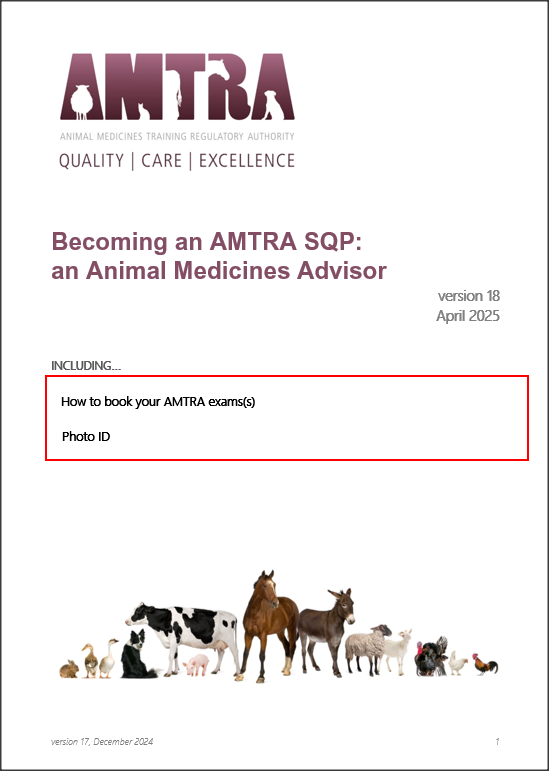Download our guide to becoming an AMTRA SQP:
Becoming an AMTRA SQP - 1. Introduction
The term Suitably Qualified Person, or SQP, is an important role defined in the Veterinary Medicines Regulations: AMTRA prefers to describe such people, particularly when talking to animal owners about the role, as animal medicines advisors, or sometimes registered animal medicines advisors (RAMAs) – it describes the role much better than SQP.
We hope in due course that the term may be changed in the Regulations: in the meantime, treat SQP and (registered) animal medicines advisor/RAMA as equivalent.
SQPs have an important and responsible role, contributing to animal health and, in the case of farm livestock, farm profitability. They are entitled to prescribe and/or supply certain veterinary medicines under the Veterinary Medicines Regulations, but to do so must act professionally including following the rules of the Regulations and of an associated Code of Practice.
AMTRA SQPs work in a variety of work environments – typically in veterinary practices, in agricultural or equine businesses, or in pet shops, but we have SQPs working for pharmaceutical companies, government, universities, charities, zoos, laboratories, the army and less obvious places. They can deal with customers face-to-face or via the telephone or Internet, but the legal and professional obligations remain the same.
Becoming an AMTRA SQP requires passing exams, but that is not the end of the process: being an AMTRA SQP means an ongoing commitment, acting responsibly, following the rules in the Regulations and Code of Practice, advising animal owners on choice of medicine and their safe and effective use, as well as other strategies, contributing to the health and welfare of their animals. There is also a requirement to do some ongoing learning known as CPD (continuing professional development) and to pay an annual fee to remain on the AMTRA Register of SQPs.
AMTRA SQPs are subject to disciplinary processes where we have reports of alleged noncompliance with the rules, and if found in breach can have action ranging from a letter of guidance through to permanent removal from the register of SQPs.
Some people working towards becoming an AMTRA SQP participate in an external training course provided by a third party, which could be face-to-face or online. Others get support from their employer, and some study solely from the AMTRA training material – the printed manual and online (available via the Harper Adams Virtual Learning Environment / VLE). Everything you need should be in the information from AMTRA. Most people find external training support very helpful but it is supplementary and not required – the decision is yours.
Whatever learning route you take, it is important that you have enrolled as a student SQP with AMTRA, and that when ready you book your exams with AMTRA – booking a training course with an external provider is not the same as either of these steps.
What you need to pass to become an AMTRA SQP
Most candidates are assessed separately in the Base Module together with whichever species modules you have chosen:
- The Farm Animal Module
- The Equine Module
- The Companion Animal Module
- The Avian Module
To become an AMTRA SQP you must pass the Base module, and at least one species module.
Alternatively, Registered Veterinary Nurses are required to take just one written exam:- The Veterinary Nurse module
The Veterinary Nurse module effectively replaces the standard Base and Companion Animal modules, but RVNs may also enrol for the Farm Animal, Equine, or Avian modules if appropriate to their needs.
| If you pass one or more written modules but fail overall to qualify as an SQP, then any pass in the written modules will cease to be considered valid after 24 months if you don’t qualify in the meantime, and these would then have to be re-sat at the normal re-sit cost. |
